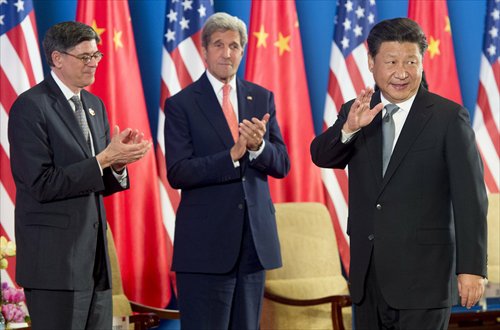Xi urges earlier BIT signing with the US
China to offer new negative list next week

Chinese President Xi Jinping (right) waves as he leaves following an opening statement alongside US Secretary of Treasury Jack Lew (left) and US Secretary of State John Kerry during the opening session of the China-US Strategic and Economic Dialogue in Beijing on Monday. Photo: AFP
President Xi Jinping on Monday called for efforts toward a swifter realization of a China-US bilateral investment treaty (BIT) that is mutually beneficial.
Xi made the remarks at the joint opening ceremony of the eighth China-US Strategic and Economic Dialogue (S&ED) and the seventh China-US High-Level Consultation on People-to-People Exchanges in Beijing.
Chinese Vice Premier Wang Yang said on Monday that China will submit next week its proposed "negative list" of sectors that would remain off-limits to US investments in a US-China BIT.
A total of 24 rounds of BIT talks have been held since negotiations began in 2008.
US Treasury Secretary Jack Lew said he looks forward to seeing the new negative list when US and Chinese BIT negotiators meet next week in Washington.
Before attending the S&ED, Lew visited Tsinghua University over the weekend, telling students that the US is waiting for China's negative list and constructive outcome from BIT talks before the end of President Barack Obama's term.
Experts said a BIT is very important for both China and the US, but negotiations require more time due to the treaty's complexity and status as the most important agreement between the two countries.
"As the BIT heralds bilateral investment treaties globally, its details require very serious discussions between the two sides. A BIT between China and the US will almost certainly become a model for later treaties with other economies, adding to its significance," Chen Fengying, a research fellow at the China Institutes of Contemporary International Relations, told the Global Times Monday.
The treaty will initially benefit bilateral investments, then enhance trade, and will further deepen communication and exchanges in other sectors, Chen noted.
In 2015, trade between China and the US reached 558.4 billion yuan ($85 billion), growing 0.6 percent year-on-year, according to data published by the Ministry of Commerce in January.
China surpassed Canada as the US' largest trading partner, while the US is China's second-largest trading partner.
Racing with time
This year's S&ED is the last one under the Obama administration, on which analysts and business groups pin their hopes, expecting substantial progress in negotiations.
Zhang Ning, a research fellow at the Chinese Academy of Social Sciences, told the Global Times on Monday that the best outcome would be the US Congress approving the treaty before the end of Obama's term.
"But whether Congress approves it remains uncertain," Zhang said, noting that striking a deal will help China on its path to becoming a more market-oriented economy.
Bai Ming, a research fellow at the Chinese Academy of International Trade and Economic Cooperation, said there is a possibility that significant progress would be made toward the signing of the treaty.
"Most of the concerns from the two sides are not new ones. We are at the compromising stage," Bai said, adding that the US is too sensitive toward some of the Chinese investments.
The US' status as the world's largest economy makes it an ideal destination for Chinese investments, Bai said.
Difficulties remain
James Zimmerman, chairman of the American Chamber of Commerce in China, said he hopes the talks could further help increase the openness, fairness and transparency of China's economy, according to a statement to the Global Times on Monday.
"Unclear laws and inconsistent interpretation was named the top challenge for members for the first time this year, and 77 percent [of our members] said they felt less welcome than before," Zimmerman was quoted by the statement as saying.
Senior Chinese officials attending the dialogue Monday said a slowly recovering world economy needs more openness in investment and trade, urging the US to fairly treat Chinese companies seeking merger and acquisition opportunities in the US.
"As China's economy grows, more companies invest abroad, and we hope Chinese firms obey foreign laws," Vice Commerce Minister Zhang Xiangchen said on Monday.
"China respects the host country's right to review Chinese investment projects, but we also hope the host country could take a fair approach," Zhang said.
For four consecutive years, Chinese investments to the US surpassed that of the US to China, according to Zhang.
Although Chinese enterprises actively look for investment opportunities in the US, they face increasingly stricter investigations from the Committee on Foreign Investment in the US, experts said.
Li Xuanmin contributed to this story